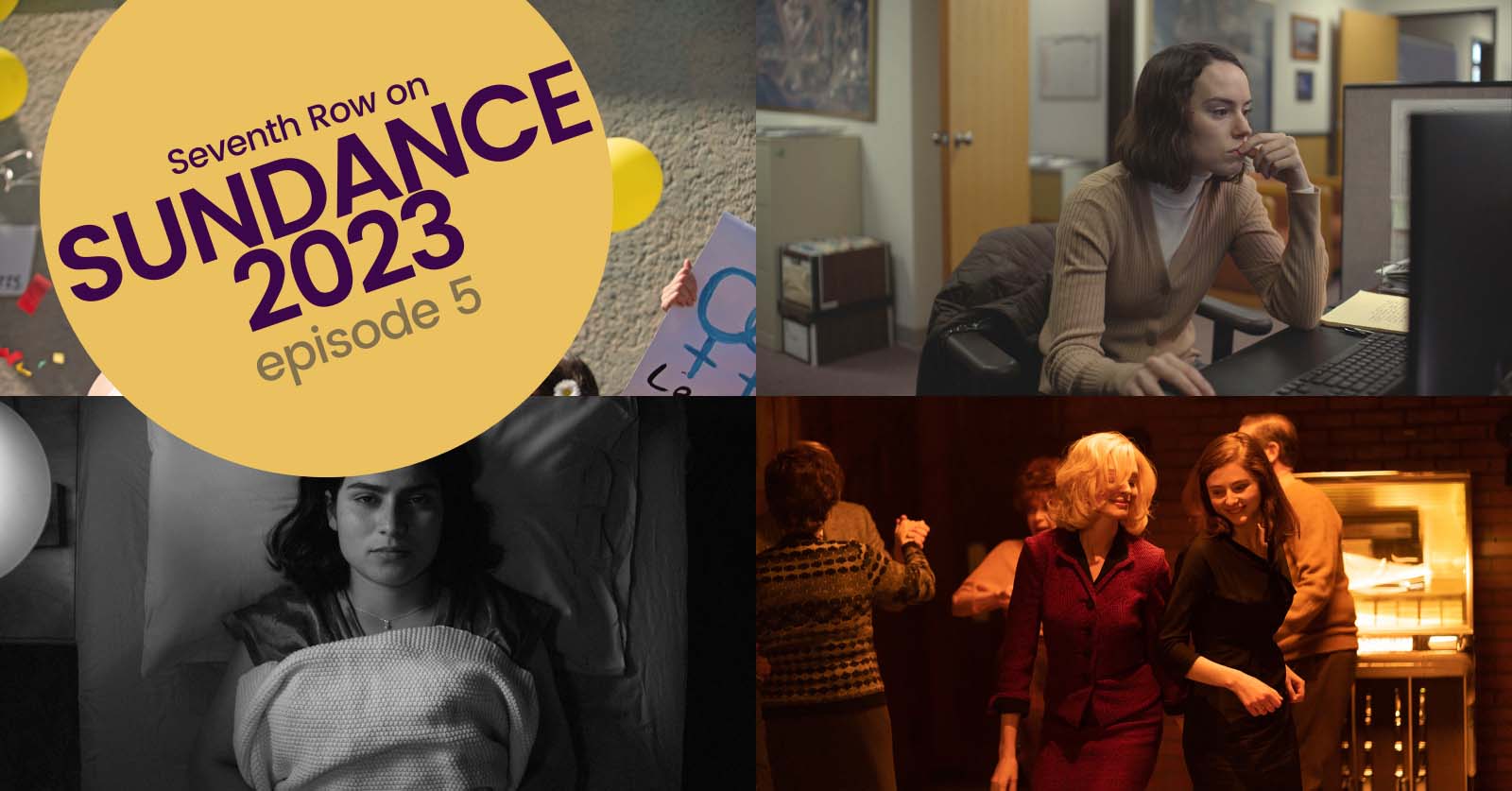In the fifth episode of the Sundance 2023 podcast season, we discuss some of this year’s buzziest titles, including William Oldroyd’s film Eileen, Andrew Durham’s film Fairyland, and some hidden gems like Babak Jalali’s film Fremont and Rachel Lambert’s film Sometimes I Think About Dying.
Don’t miss a single episode. Become a member.
Get exclusive access to our entire podcast archive of 150+ episodes, all future members-only episodes, and early access to new podcast seasons.


Listen to the whole Sundance 2023 season
Today is the third of many episodes of the 2023 Sundance season of the Seventh Row podcast.
Sundance 2023 runs from January 19-28, and we’ll be covering this year’s festival in a new podcast season about the films this year and how the programming fits into the festival’s history.
Listen to all the episodes to discover the year’s best and worst films, and how this year’s program jives with past festivals.
About the episode: Eileen, Fairyland, Fremont, Sometimes I Think About Dying, and more films
- 00:00 Introduction
- 01:49 Brief thoughts on Mutt, Cassandro, Polite Society, Theater Camp
- 17:58 Sometimes I Think About Dying directed by Rachel Lambert
- 28:45 Fremont by Babak Jalali
- 36:16 Eileen by William Oldroyd
- 51:43 Fairyland by Andrew Durham
- 1:08:59 Sundance bingo
In this episode, we discuss some of the buzziest films of the first half of the festival and some of our favourites — though there isn’t much overlap. We give brief thoughts on the films Mutt, Cassandro (starring Gael García Bernal), Polite Society, and Theater Camp. Next, we go deep on festival favourites like the sophomore feature films from Rachel Lambert (Sometimes I Think About Dying) and William Oldroyd (Eileen), as well as Babak Jalali’s low-budget film Fremont. We also discuss why the film Fairyland. about queer culture in San Francisco in the 70s/80s and the AIDS crisis, was disappointing
How to follow our Sundance 2023 coverage
Subscribe to our newsletter for updates on the 2023 Sundance podcast season and coverage on the website.
Follow Seventh Row on Twitter and Instagram @SeventhRow; Alex Heeney on Twitter and Instagram @bwestcineaste; and Orla Smith on Twitter and Instagram.
Show Notes on the E5 of the Sundance 2023 podcast season:
- Read Orla Smith’s analysis of Thomasin McKenzie’s performance in Leave No Trace, which appears in our ebook Leave No Trace: A Special Issue. Leave No Trace premiered at Sundance, and McKenzie returns to Sundance this year as the lead of William Oldroyd’s Eileen.
- Read Alex Heeney’s analysis of Gael García Bernal’s performance in Ema, and why he is one of the very best actors working today. Bernal stars in and is the highlight of Cassandro.
- View the list of all of the films covered on the Sundance 2023 podcast
- Sundance 2023 season (FREE): Catch up with all of our episodes.
- Discover all of our past podcast episodes on films that screened at Sundance.
Related episodes to E5
All of our podcasts that are more than six months old are only available to members. We also regularly release members only bonus episodes. Many of the episodes listed here are now only available to members (Members Only).
- Ep. 1: Leave No Trace (FREE): We first fell in love with Thomasin McKenzie for her work in the Sundance film Leave No Trace, which we wrote a book about. In this companion episode to the book, we discuss why the film was so great and what a talent McKenzie is. McKenzie returned to Sundance this year as the star of William Oldroyd’s film Eileen.
- Ep. 22: The King (FREE): In this crossover episode with our Shakespeare Podcast, 21st Folio, we watch the terrible film The King for you, and report back on what a mess it is and how under-used Thomasin McKenzie is.
- Ep. 91: AIDS on screen, featuring It’s a Sin (MEMBERS ONLY): In this episode, we give an overview of films/TV/recorded theatre dating back to the 1990s that have addressed the AIDS crisis. It’s a must listen before seeing Fairyland and offers many recommendations for films that address the AIDS crisis well (which Fairyland does not).
- Ep. 98: Angels in America adaptations (MEMBERS ONLY): Tony Kushner’s Angels in America is one of the most famous AIDS plays, and we delve deep into the HBO miniseries and the National Theatre’s 2016 recorded production. We also talk about how the two productions address the AIDS crisis and how the views of the play have shifted in the last 20 years.
Listen to all the related episodes. Become a member.
For exclusive access to all of our episodes, including all of our in-between season episodes:
For exclusive access to all of our episodes, including all of our in-between season episodes:
Speakers on this episode
Host Alex Heeney is the Editor-in-Chief of Seventh Row. Find her on Twitter @bwestcineaste.
Host Orla Smith is the Executive Editor of Seventh Row. Find her on Instagram @orla_p_smith.
Episode transcript
The transcript for the free excerpt of this episode was AI-generated by Otter.ai.
[fusebox_transcript]

